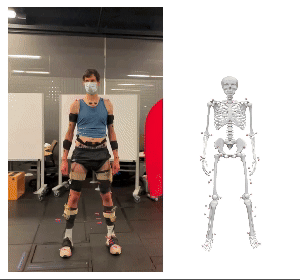AI4Health News

GenHMR: A Breakthrough in 3D Human Pose and Shape Estimation – Accepted at AAAI 2025
We are pleased to announce that our paper, “GenHMR: Generative Human Mesh Recovery for Accurate 3D Pose and Shape Estimation,” has been accepted for presentation at AAAI 2025. GenHMR introduces a novel generative framework that surpasses existing methods in parametric 3D human pose and shape (HPS) estimation, offering state-of-the-art accuracy and robustness. Advancing 3D Human […]

BSKI: Advancing Vision-Language Models for Understanding Activities of Daily Living – Accepted at AAAI 2025
We are excited to share that our paper, “BSKI Models: Skeleton-Induced Vision-Language Embeddings for Understanding Activities of Daily Living,” has been accepted at AAAI 2025. This research introduces BSKI, a Skeleton-Induced Vision-Language model designed for recognizing Activities of Daily Living (ADLs), with critical applications in healthcare, elderly care, and behavioral monitoring. Enhancing Health Monitoring with […]

BioPose: Advancing Biomechanically-Accurate 3D Pose Estimation – Accepted at WACV 2025
We are pleased to announce that our paper, “BioPose: Biomechanically-Accurate 3D Pose Estimation from Monocular Videos,” has been accepted for presentation at WACV 2025. This work introduces a novel framework for biomechanically accurate 3D human pose estimation, bridging the gap between learning-based methods and physics-based motion analysis. Advancing 3D Pose Estimation for Real-World Applications Conventional […]

Enhancing First Responder Training with AI-Driven Platforms
The realm of emergency response is set to witness a transformation with the introduction of an AI-driven training platform designed specifically for first responders. This innovative platform leverages the power of artificial intelligence to simulate real-life emergency scenarios, allowing first responders to train in a controlled yet realistic environment. Highlights of the platform include: With […]

Promoting Smart Elderly Care through Advanced Technologies
The Human Digital Twin (HDT) initiative is taking a leap into the future of geriatric care. With a vision of “hospital at home,” the project aims to revolutionize elderly care through noninvasive continuous monitoring. The primary goal of the HDT initiative in geriatric care is to provide early warnings of health risks, ensuring that the […]

Revolutionizing Athlete Training with Human Digital Twins
In a groundbreaking move, researchers and sports professionals have come together to launch the Human Digital Twin (HDT) project, aiming to redefine the future of athlete training and management. The HDT project focuses on creating a digital replica of athletes, capturing their physiological, biomechanical, and behavioral data in real-time. This initiative promises to offer unparalleled […]